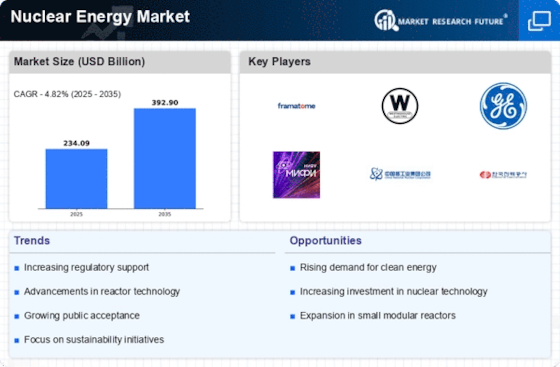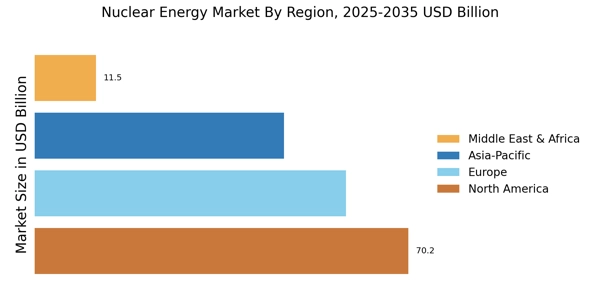Rising Energy Demand
The Nuclear Energy Market is experiencing a surge in energy demand, driven by increasing population and industrialization. As economies expand, the need for reliable and sustainable energy sources becomes paramount. According to recent data, energy consumption is projected to rise by approximately 30% by 2040. This growing demand places nuclear energy at the forefront, as it offers a stable and low-carbon alternative to fossil fuels. The Nuclear Energy Market is thus positioned to play a crucial role in meeting this demand, particularly in regions where renewable energy sources may not suffice. The ability of nuclear power to provide baseload energy makes it an attractive option for countries aiming to balance energy security with environmental sustainability. Consequently, investments in nuclear technology and infrastructure are likely to increase, further solidifying its role in the energy landscape.
Climate Change Mitigation
The urgency to address climate change is propelling the Nuclear Energy Market into the spotlight. As nations commit to reducing greenhouse gas emissions, nuclear energy emerges as a viable solution due to its low carbon footprint. The International Energy Agency indicates that nuclear power could contribute significantly to achieving net-zero emissions targets by 2050. This potential is particularly relevant as countries seek to transition away from coal and other high-emission energy sources. The Nuclear Energy Market is thus seen as a key player in the global effort to combat climate change, with many governments investing in new reactor designs and technologies that enhance safety and efficiency. The increasing recognition of nuclear energy's role in sustainable development is likely to drive further policy support and investment, reinforcing its position in the energy mix.
Technological Advancements
Innovations in nuclear technology are reshaping the Nuclear Energy Market, enhancing safety, efficiency, and public perception. Developments such as small modular reactors (SMRs) and advanced reactor designs promise to address some of the historical challenges associated with nuclear power. These technologies not only improve operational efficiency but also reduce construction costs and timelines. For instance, SMRs can be deployed in remote locations, providing energy to underserved areas. The Nuclear Energy Market is thus witnessing a transformation that could attract new investments and partnerships. Furthermore, advancements in waste management and decommissioning processes are likely to alleviate public concerns, fostering a more favorable environment for nuclear energy expansion. As these technologies mature, they may significantly alter the competitive landscape of the energy sector, positioning nuclear energy as a more attractive option for future energy needs.
Public Perception and Acceptance
Public perception plays a pivotal role in shaping the Nuclear Energy Market. While nuclear energy is often viewed with skepticism due to safety concerns, ongoing education and transparency initiatives are gradually improving its image. Surveys indicate that a growing segment of the population recognizes the benefits of nuclear energy, particularly in the context of climate change and energy security. The Nuclear Energy Market is actively engaging with communities to address concerns and highlight advancements in safety protocols and technology. As public acceptance increases, it is likely that more countries will consider nuclear energy as a viable option for their energy portfolios. This shift in perception could lead to greater political support and investment, ultimately facilitating the expansion of nuclear energy infrastructure and its integration into the broader energy mix.
Government Policies and Incentives
Supportive government policies are crucial for the growth of the Nuclear Energy Market. Many countries are implementing frameworks that promote nuclear energy as part of their energy strategies. These policies often include financial incentives, regulatory streamlining, and research funding aimed at enhancing nuclear technology. For example, some nations have established long-term contracts for nuclear power purchase, ensuring stable revenue streams for operators. Additionally, the Nuclear Energy Market benefits from international collaborations that share best practices and technological advancements. As governments recognize the importance of energy security and climate goals, the likelihood of increased funding and favorable regulations appears high. This supportive environment is expected to stimulate investment in nuclear projects, thereby expanding the market and reinforcing the role of nuclear energy in the overall energy landscape.

















